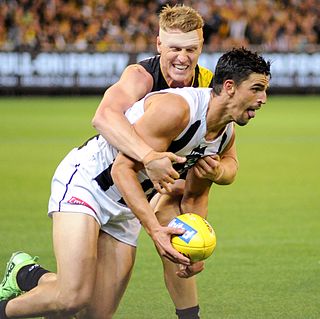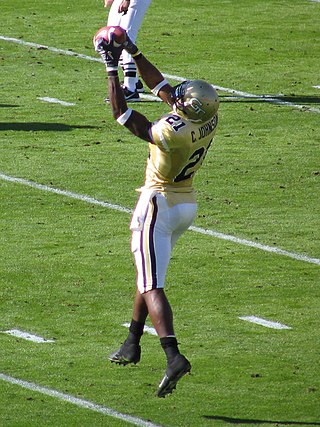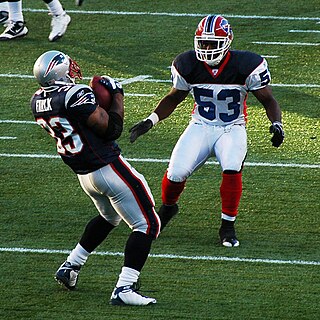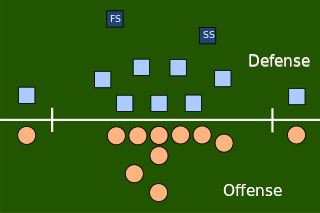
Most forms of football have a move known as a tackle. The primary purposes of tackling are to dispossess an opponent of the ball, to stop the player from gaining ground towards goal or to stop them from carrying out what they intend.

Field hockey is a team sport structured in standard hockey format, in which each team plays with 11 players in total, made up of 10 field players and a goalkeeper. Teams must move a hockey ball around a pitch by hitting it with a hockey stick towards the rival team's shooting circle and then into the goal. The match is won by the team that scores the most goals. Matches are played on grass, watered turf, artificial turf, or indoor boarded surface.

Volleyball is a team sport in which two teams of six players are separated by a net. Each team tries to score points by grounding a ball on the other team's court under organized rules. It has been a part of the official program of the Summer Olympic Games since Tokyo 1964. Beach volleyball was introduced to the programme at the Atlanta 1996 Summer Olympics. The adapted version of volleyball at the Summer Paralympic Games is sitting volleyball.

In many team sports that involve scoring goals, the goalkeeper is a designated player charged with directly preventing the opposing team from scoring by blocking or intercepting opposing shots on goal. Such positions exist in bandy, rink bandy, camogie, association football, Gaelic football, international rules football, floorball, handball, hurling, field hockey, ice hockey, roller hockey, lacrosse, ringette, rinkball, water polo, and shinty, as well as in other sports.

A wide receiver (WR), also referred to as a wideout, and historically known as a split end (SE) or flanker (FL), is an eligible receiver in gridiron football. A key skill position of the offense, WR gets its name from the player being split out "wide", farthest away from the rest of the offensive formation.
A screen pass is a play in gridiron football consisting of a short pass to a receiver who is protected by a screen of blockers. During a screen pass, a number of things happen concurrently in order to fool the defense into thinking a long pass is being thrown, when in fact the pass is merely a short one, just beyond the defensive linemen. Screens are usually deployed against aggressive defenses that rush the passer. Because screens invite the defense to rush the quarterback, they are designed to leave fewer defensemen behind the rushers to stop the play.

A fair catch is a feature of American football and several other codes of football, in which a player attempting to catch a ball kicked by the opposing team – either on a kickoff or punt – is entitled to catch the ball without interference from any member of the kicking team. A player, usually a return specialist, wishing to make a fair catch signals his intent by extending one arm above his head and waving it while the kicked ball is in flight. A ball caught in this manner becomes dead once caught, i.e., the player catching the ball is not entitled to advance the ball, and the receiving team begins its drive at the spot where the ball was caught.
In American and Canadian gridiron football, pass interference (PI) is a foul that occurs when a player interferes with an eligible receiver's ability to make a fair attempt to catch a forward pass. Pass interference may include tripping, pushing, pulling, or cutting in front of the receiver, covering the receiver's face, or pulling on the receiver's hands or arms. It does not include catching or batting the ball before it reaches the receiver. Once the ball touches any defensive player or eligible offensive receiver, the above rules no longer apply and the defender may tackle the receiver or attempt to prevent them from gaining control of the ball. Once a forward pass is in the air it is a loose ball and thus any eligible receiver – all defensive players are eligible receivers – may try to catch it. When a defensive player catches a forward pass it is an interception and their team gains possession of the ball. Some actions that are defined as pass interference may be overlooked if the defender is attempting to catch or bat the ball rather than focusing on the receiver.
An incomplete pass is a term in gridiron football which means that a legal forward pass is not successfully caught by an eligible offensive player within the field of play. An incomplete pass can occur if (1) the ball hits the ground in the field of play before a player on either team gains possession; (2) the ball is caught by a player on either team who, at the moment of possession is out of bounds; or (3) the ball is thrown outside the field of play. An incomplete pass causes the down to advance by one and the offensive team gains no yards. The game clock is stopped.
A formation in American football refers to the position players line up in before the start of a down. There are both offensive and defensive formations and there are many formations in both categories. Sometimes, formations are referred to as packages.
Jamar Mondell Israel, born Jamar Mondell Fletcher, is an American former college and professional football player who was a cornerback in the National Football League (NFL) for eight seasons in the early 2000s. He played college football for the University of Wisconsin, and was a two-time All-American. The Miami Dolphins chose him in the first round of the 2001 NFL Draft, and he also played professionally for the San Diego Chargers, Detroit Lions, Houston Texans and Cincinnati Bengals of the NFL.
A trick play, also known as a gadget play, gimmick play or trickeration, is a play in gridiron football that uses deception and unorthodox tactics to fool the opposing team. A trick play is often risky, offering the potential for a large gain or a touchdown if it is successful, but with the chance of a significant loss of yards or a turnover if not. Trick plays are rarely used not only because of the riskiness, but also to maintain the element of surprise for when they are used.

In American football, the specific role that a player takes on the field is referred to as their "position". Under the modern rules of American football, both teams are allowed 11 players on the field at one time and have "unlimited free substitutions", meaning that they may change any number of players during any "dead ball" situation. This has resulted in the development of three task-specific "platoons" of players within any single team: the offense, the defense, and the so-called 'special teams'. Within these three separate "platoons", various positions exist depending on the jobs that the players are doing.

Safety is a position in gridiron football on the defense. The safeties are defensive backs who line up ten to fifteen yards from the line of scrimmage. There are two variations of the position: the free safety and the strong safety. Their duties depend on the defensive scheme. The defensive responsibilities of the safety and cornerback usually involve pass coverage towards the middle and sidelines of the field. While American (11-player) formations generally use two safeties, Canadian (12-player) formations generally have one safety and two defensive halfbacks, a position not used in the American game.
In American football, a play is a close-to-the-ground plan of action or strategy used to move the ball down the field. A play begins at either the snap from the center or at kickoff. Most commonly, plays occur at the snap during a down. These plays range from basic to very intricate. Football players keep a record of these plays in a playbook.
This is a list of the more common English volleyball jargon terms:
Kent Auburn McCloughan is an American former professional football player who was a cornerback for the American Football League (AFL)'s Oakland Raiders from 1965 through 1969, and for the National Football League (NFL)'s Raiders in 1970. He played college football for the Nebraska Cornhuskers. His pro career ended early because of a devastating knee injury.
The following terms are used in American football, both conventional and indoor. Some of these terms are also in use in Canadian football; for a list of terms unique to that code, see Glossary of Canadian football.

Roundnet is a ball game created in 1989 by Jeff Knurek, inspired primarily by concepts from volleyball. The game is played between two teams, usually with two players each. Players initially line up around a small trampoline-like net at the start of a point and starts with a serve from one team to another. Teams alternate hitting the ball back to the net.
The Prayer at Jordan-Hare was a game-winning Hail Mary pass thrown during a college football game between the Auburn Tigers and Georgia Bulldogs, played on November 16, 2013, at Jordan-Hare Stadium in Auburn in the 117th installment of the Deep South's Oldest Rivalry.









